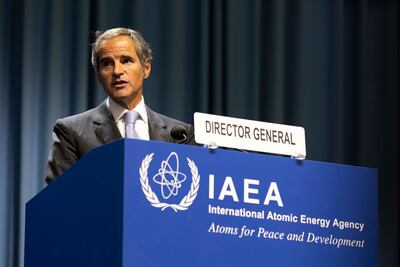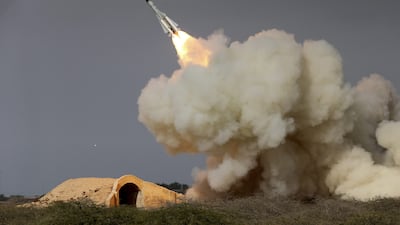The tone of the speeches delivered by world leaders at the UN General Assembly last week and on its sidelines, during inter-ministerial meetings, suggests preparations to revive the nuclear deal between Iran and the global powers have gathered speed.
Amid reports that talks could resume in Vienna in two weeks, a process is on to clear any obstacles to the nuclear issue, including to eventually lift all meaningful sanctions against Iran. Ideas to address Tehran’s contentious ballistic missile programme are under discussion, too. An agreement is being sought to limit Iran’s long-range missile programme while allowing it to maintain short and medium-range missiles crucial to its regional projects.
With the Europeans and Americans seemingly willing to allow Iran to pursue these projects, the countries in the region are beginning to reposition themselves accordingly.
The Assad regime in Syria may be among the biggest beneficiaries, due in large part to efforts from Russia, the US, Europe and key Arab states to end the decade-long civil war there. Only Turkey appears to be singing a different tune, for reasons related to Russian insistence on Ankara’s exit from Syria.
Iraqi President Barham Salih’s recent remarks to the Council on Foreign Relations in New York are instructive.
He said the US and Russia are speaking of collaboration in Syria. Alluding to years-long efforts by the West and its regional allies to remove the Assad regime from power, Mr Salih said the international community "must have the courage to admit that the present policy has totally, utterly failed". "The government is still there and you have thousands and thousands of militants [who are] well-armed [belonging to] Al Qaeda, ISIS, you name it, all kind of manifestations and variants of this virus.”
Thereafter, Mr Salih called for the region to “embrace this dynamic in Syria”. He added: “We in Iraq are opening up to the Syrian government and trying to open channels and encourage help and relief to the Syrian people. We want to focus on dealing with the extremist issue in some of these areas of Syria, which pose a direct security threat to Iraq and to the neighbourhood.”
Russia – an ally of the Syrian regime – will, no doubt, be pleased with these developments and statements, as it tries to mobilise political and financial support for reconstruction and fighting extremism there.

Saudi Arabia's King Salman, meanwhile, raised hopes for a serious dialogue with Iran, especially with a new president in power in Tehran and the revival of the nuclear deal increasingly likely. King Salman expressed a desire for reconciliation, but on the condition that it amounts to a roadmap for positive Saudi-Iranian relations, while reserving the right to question Tehran’s objectives and policies inside Arab countries such as Yemen, Iraq, Syria, and Lebanon, where it has planted proxy militias and engaged in subterfuge.
For his part, Iranian President Ebrahim Raisi lectured Washington at the UN, while professing innocence over its nuclear, missile and expansionist activities. He questioned the Biden administration's intentions, setting a tough line but only half-seriously, given that Iran is preparing to return to the Vienna talks and rowing back from its conditions for the complete lifting of sanctions first.
The regime knows that its interests require the lifting of economic sanctions as a matter of priority and is heeding to advice from Russia and China while capitalising on Europe’s eagerness to change the nature of its relations with Tehran. Indeed, the Europeans, led by the Germans, Italians, and French, have told the Iranians they want a new approach to their relationship based on peaceful coexistence.

In other words, Europe wants a relationship of affinity based on mutual economic interests and European tolerance of Iran’s regional policies, in return for Tehran refraining from extreme measures that would embarrass Europe – for example, by supporting terrorism or acting in ways that lead to refugee waves towards Europe. In return for all of this, Iran will get European backing for lifting what is left of the sanctions on Iran, and the latter's political rehabilitation in the international community.
The Europeans, it seems, want to play a key role on Iranian issues, which they believe can help shape regional equations. But as a consequence, smaller nations in the region are likely to suffer – particularly Lebanon.
Judging by Europe’s intentions, it seems that its member states will not interfere with Hezbollah’s complete domination over the Lebanese state. In Syria, Europe is endorsing the rehabilitation of the Assad regime and is working with the US towards this end.
How will this be reflected in Lebanon, and could it lead to the return of Syria's domination of the country's politics, either directly or through Hezbollah? Well, all that matters to the Europeans is that Lebanon does not collapse, even if much-needed political reforms are not carried out in the country. In fact, France and Europe’s policies have led to the consolidation of the Lebanese political class, despite its corruption and assault on accountability.

The Europeans and Americans have paid little attention to personal attacks against Tarek Bitar, the Lebanese judge investigating last year's Beirut Port blast. They have effectively endorsed impunity for what is a crime against humanity, and the political, sectarian and partisan attacks on a man doing his duty to reveal the identity of those responsible for blast.
In his speech at the UN, US President Joe Biden put diplomacy above confrontation. Yet, despite his electoral promises to protect human rights and justice everywhere, he now stands idly by as Hezbollah issues audacious threats against Mr Bitar and similar such attempts to undermine the rule of law.
Mr Biden’s promises are vanishing into thin air, possibly due to his concern that any move on his part to pressurise Beirut to end impunities of all kinds will risk thwarting a deal with Hezbollah's patrons in Iran.


